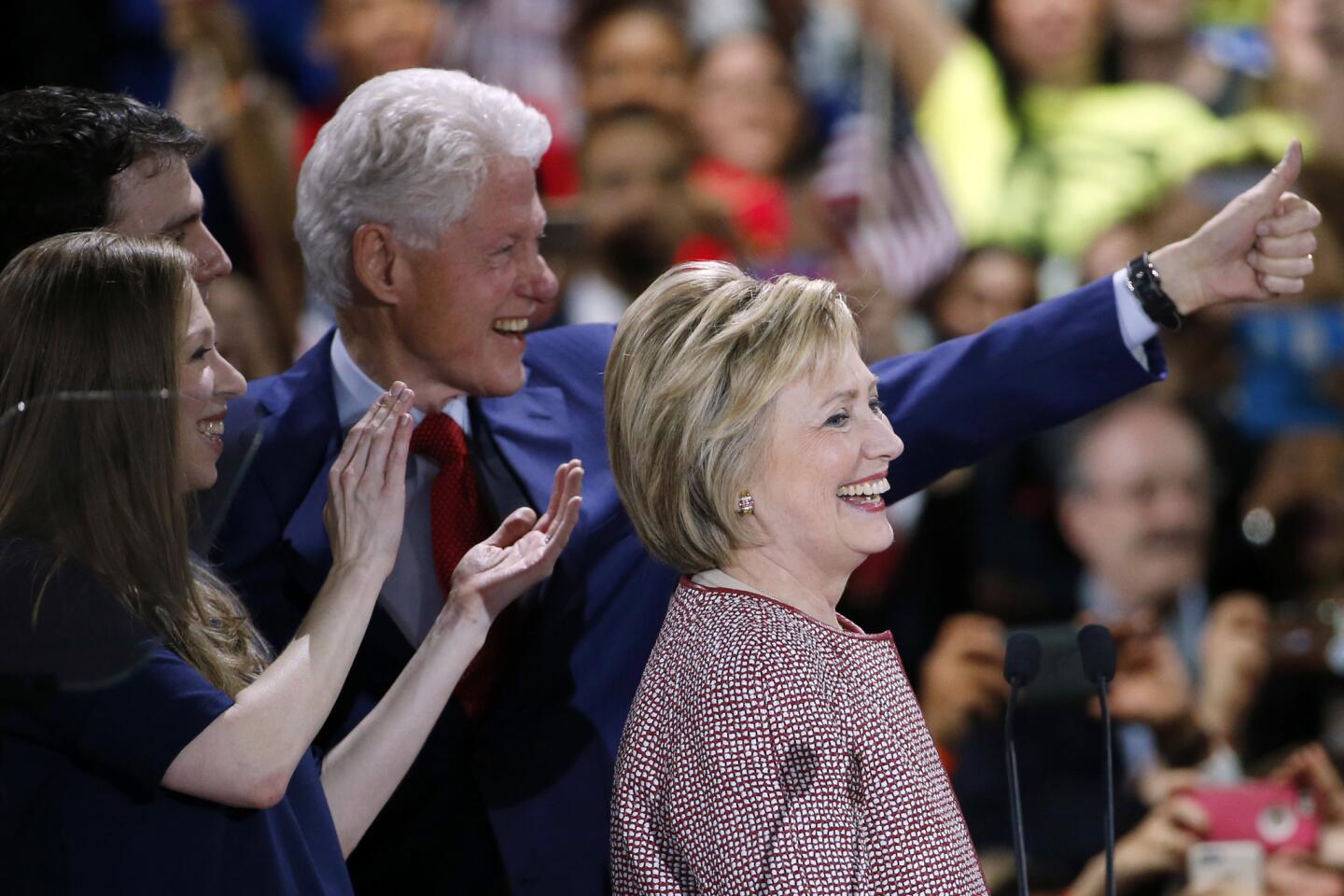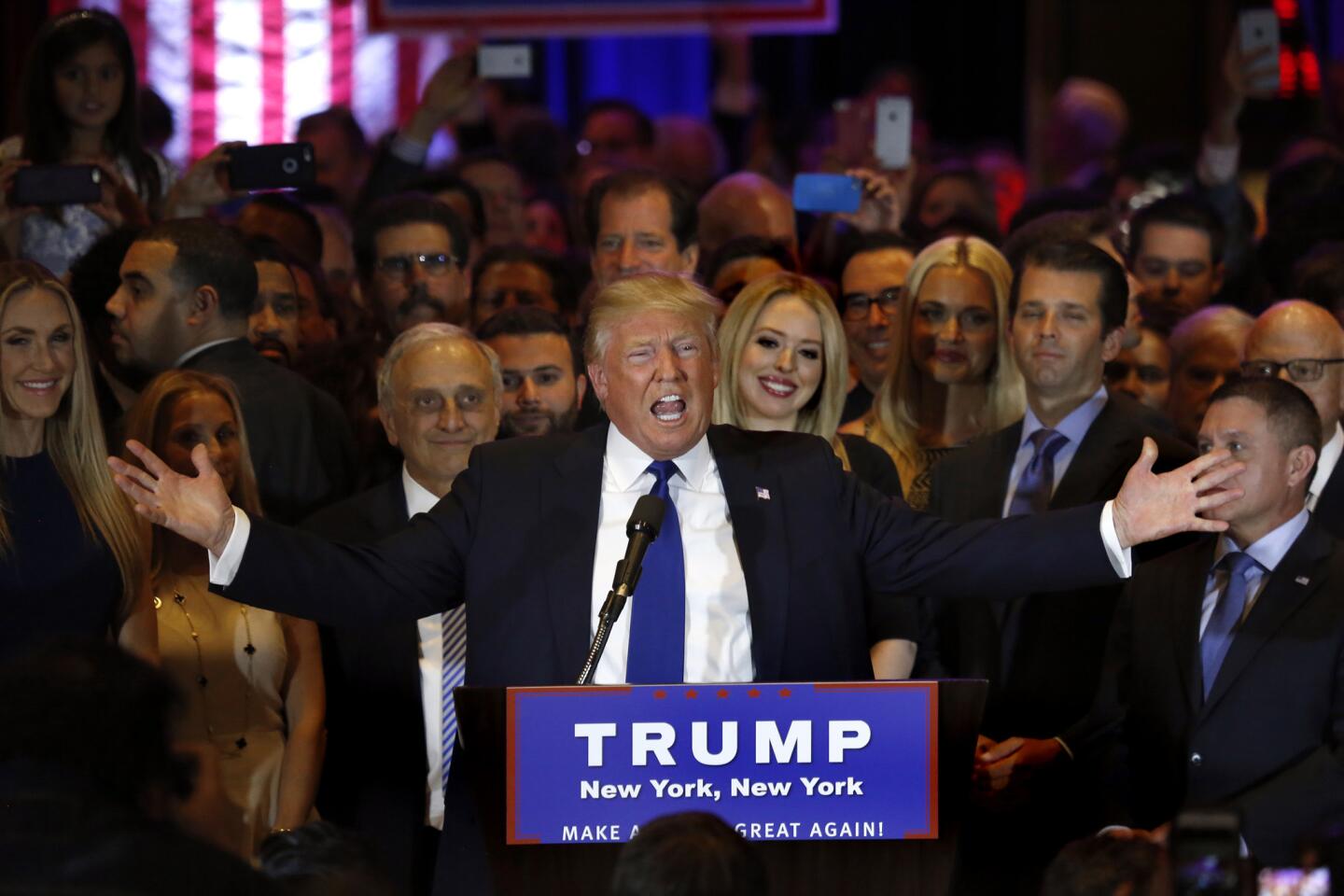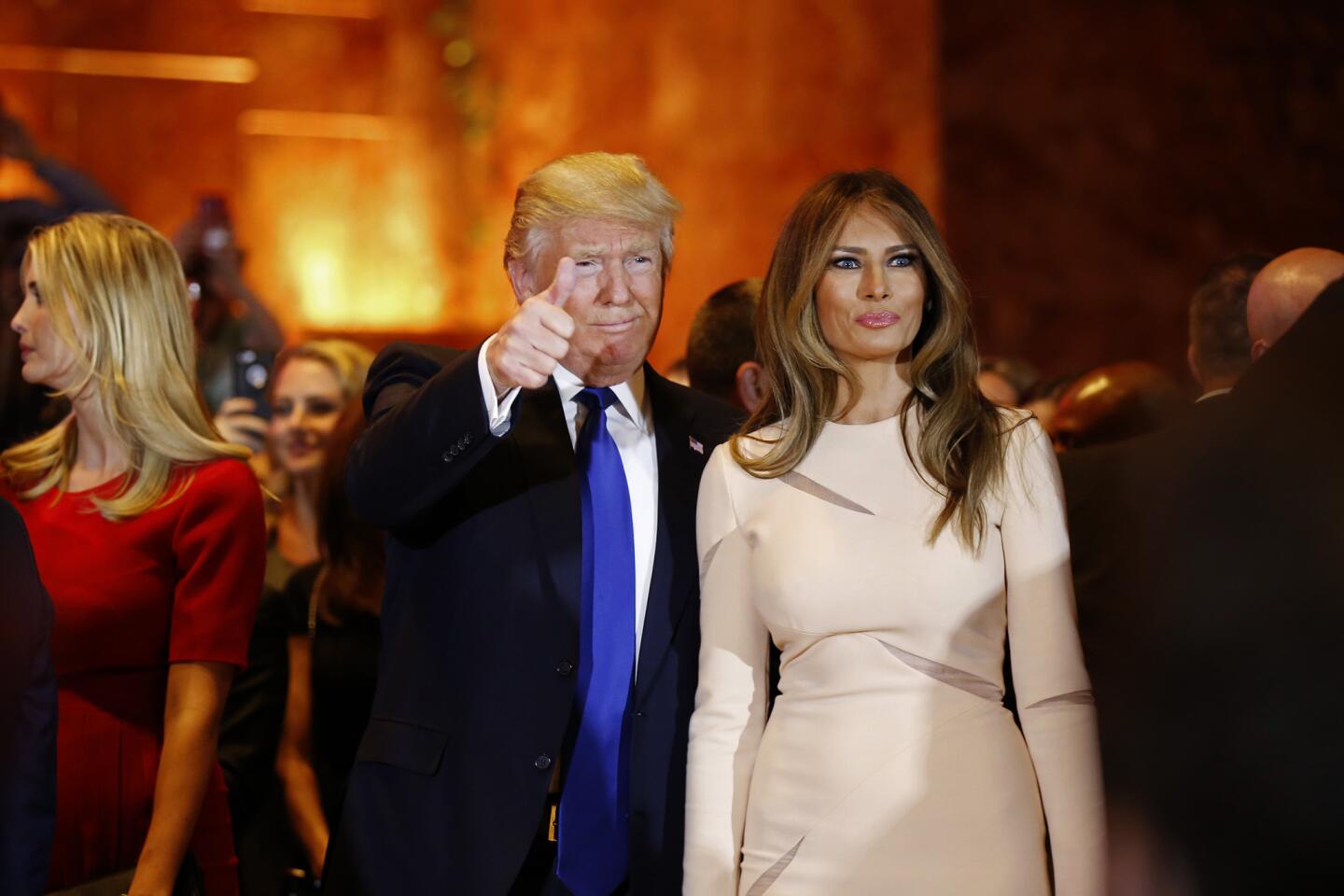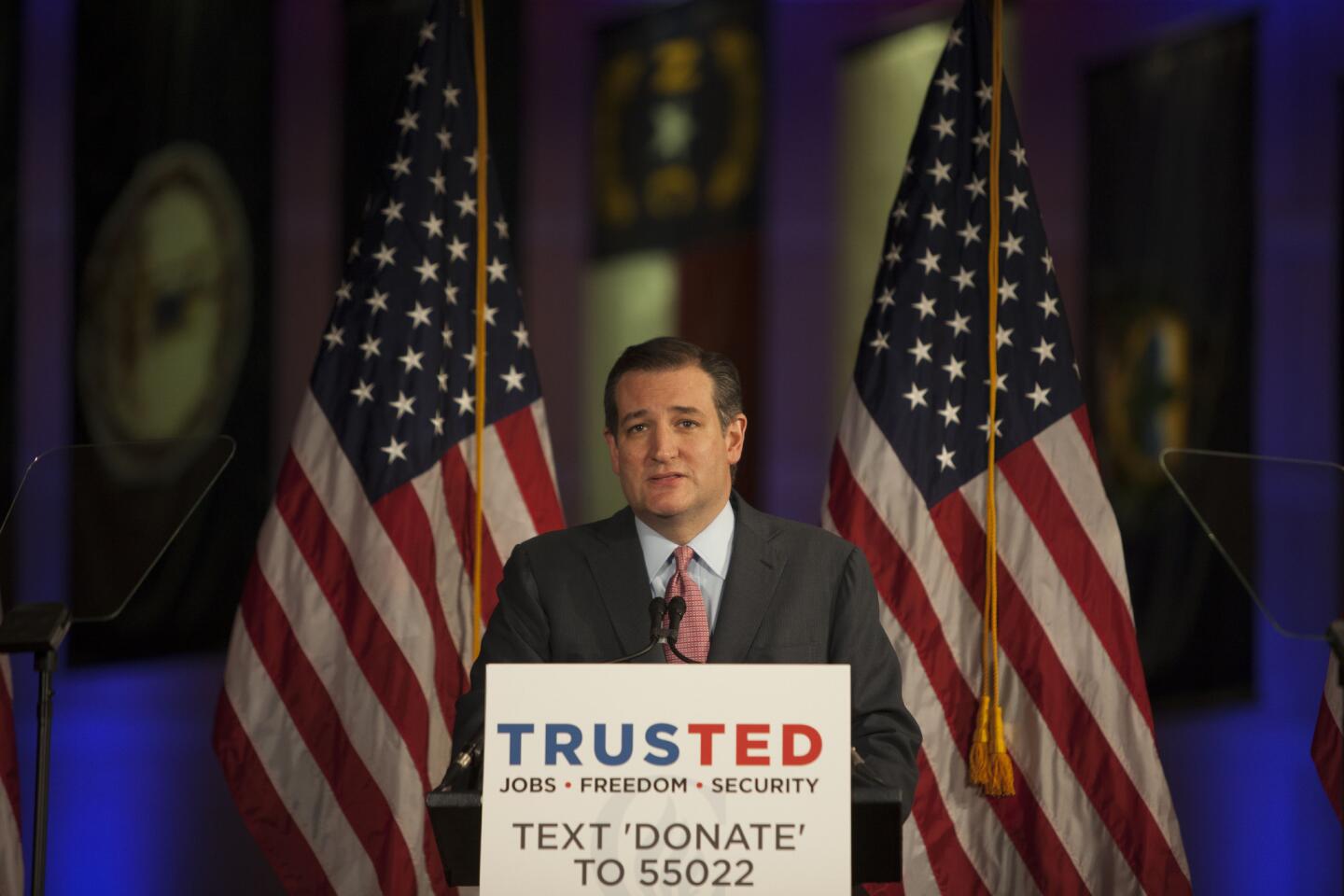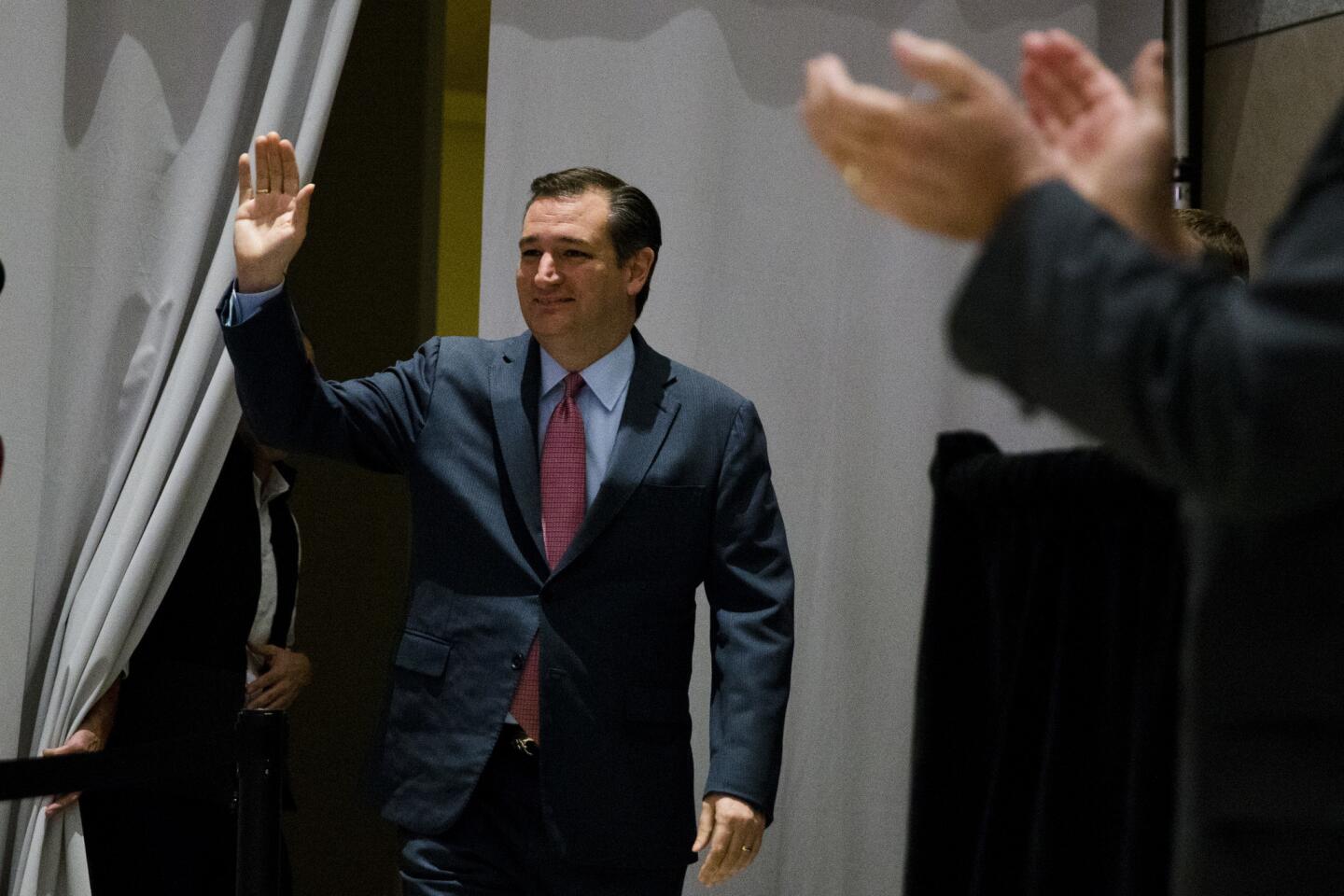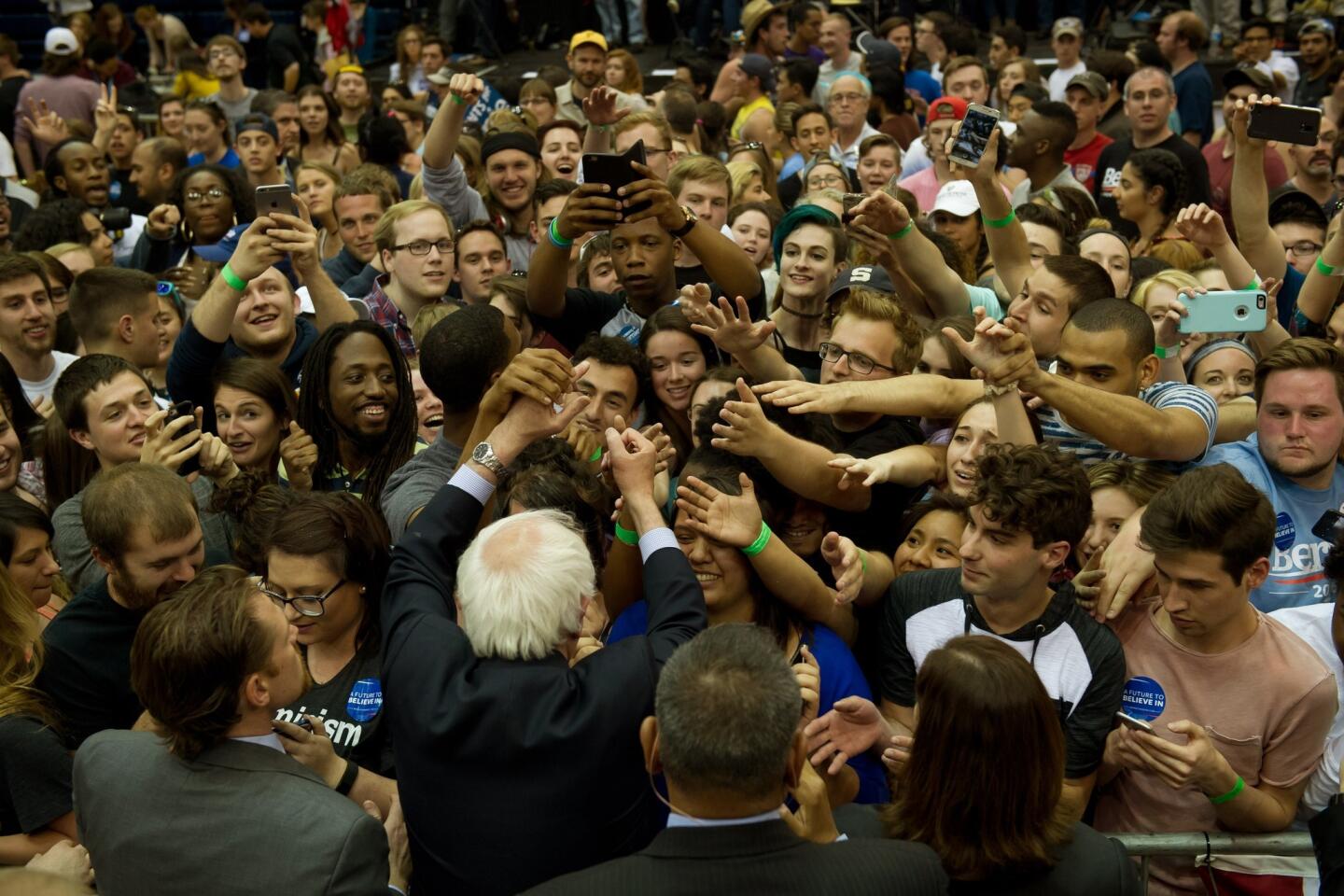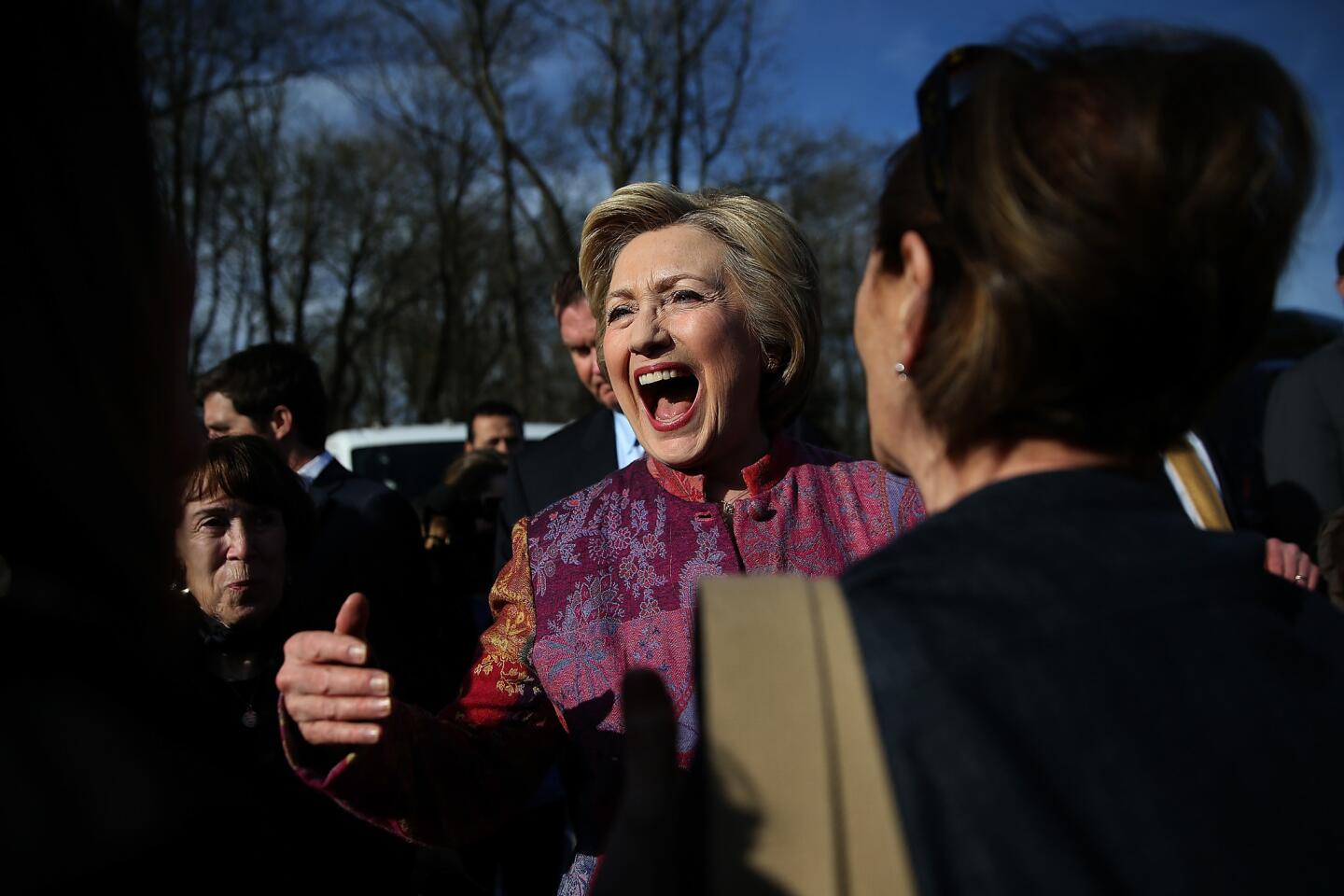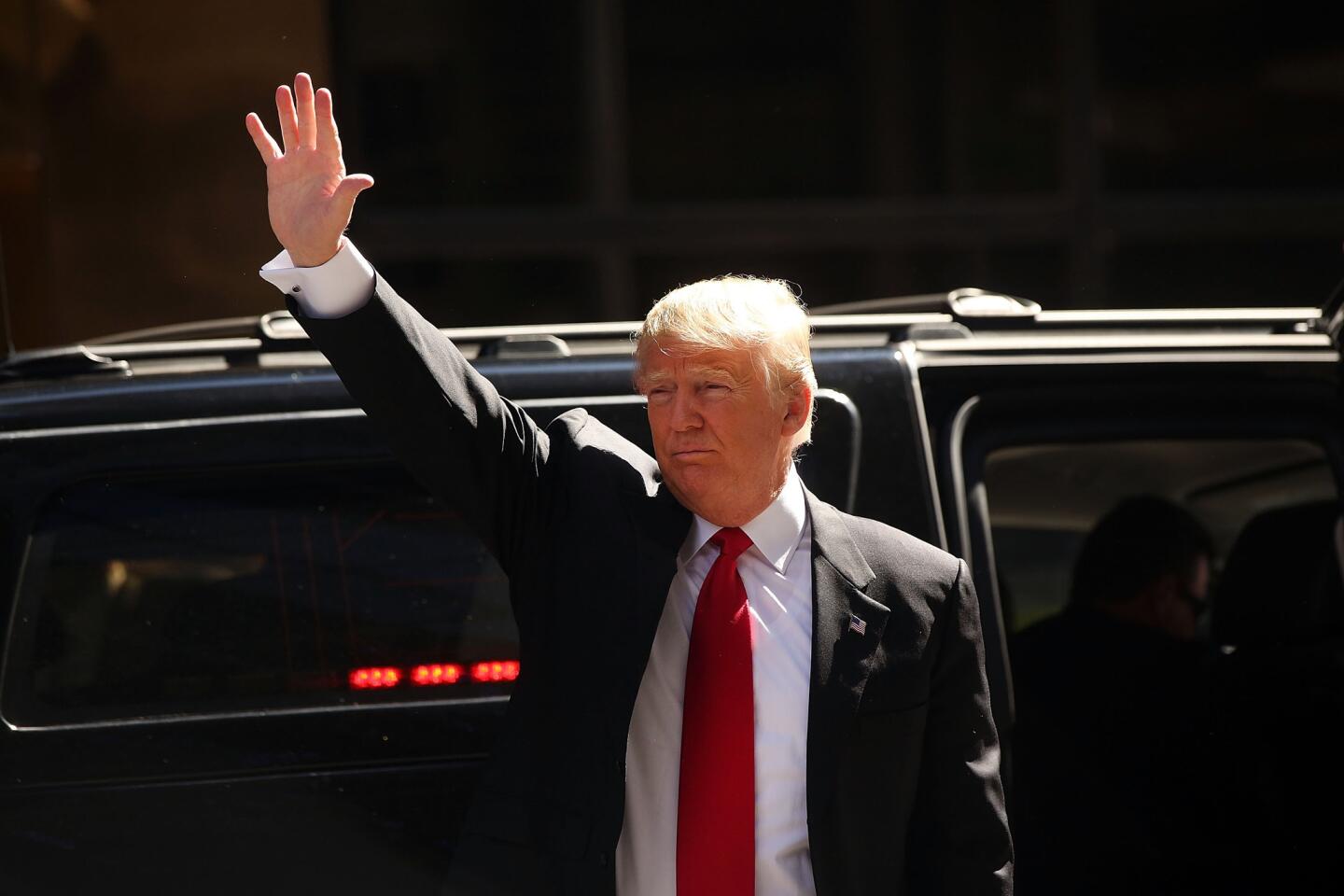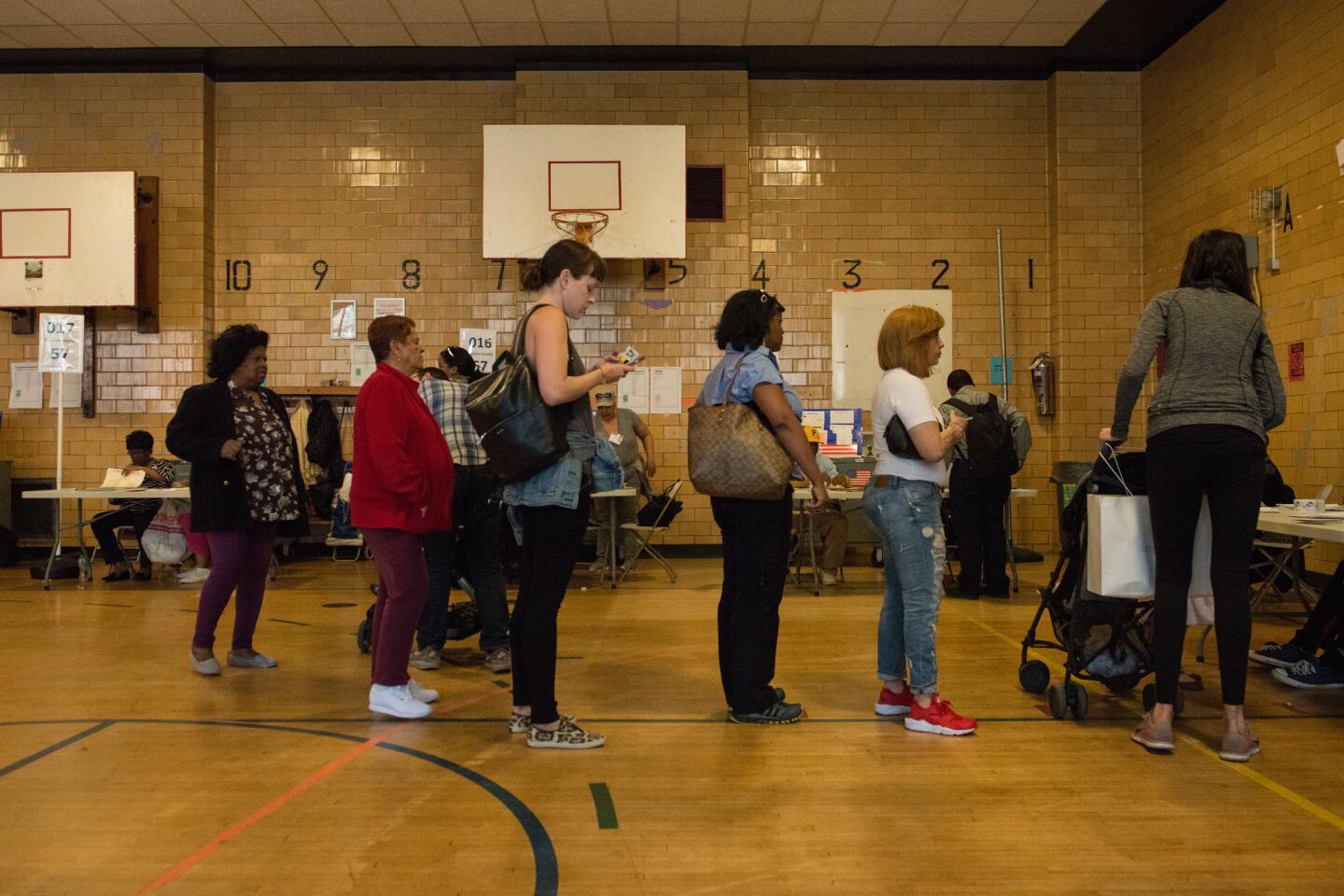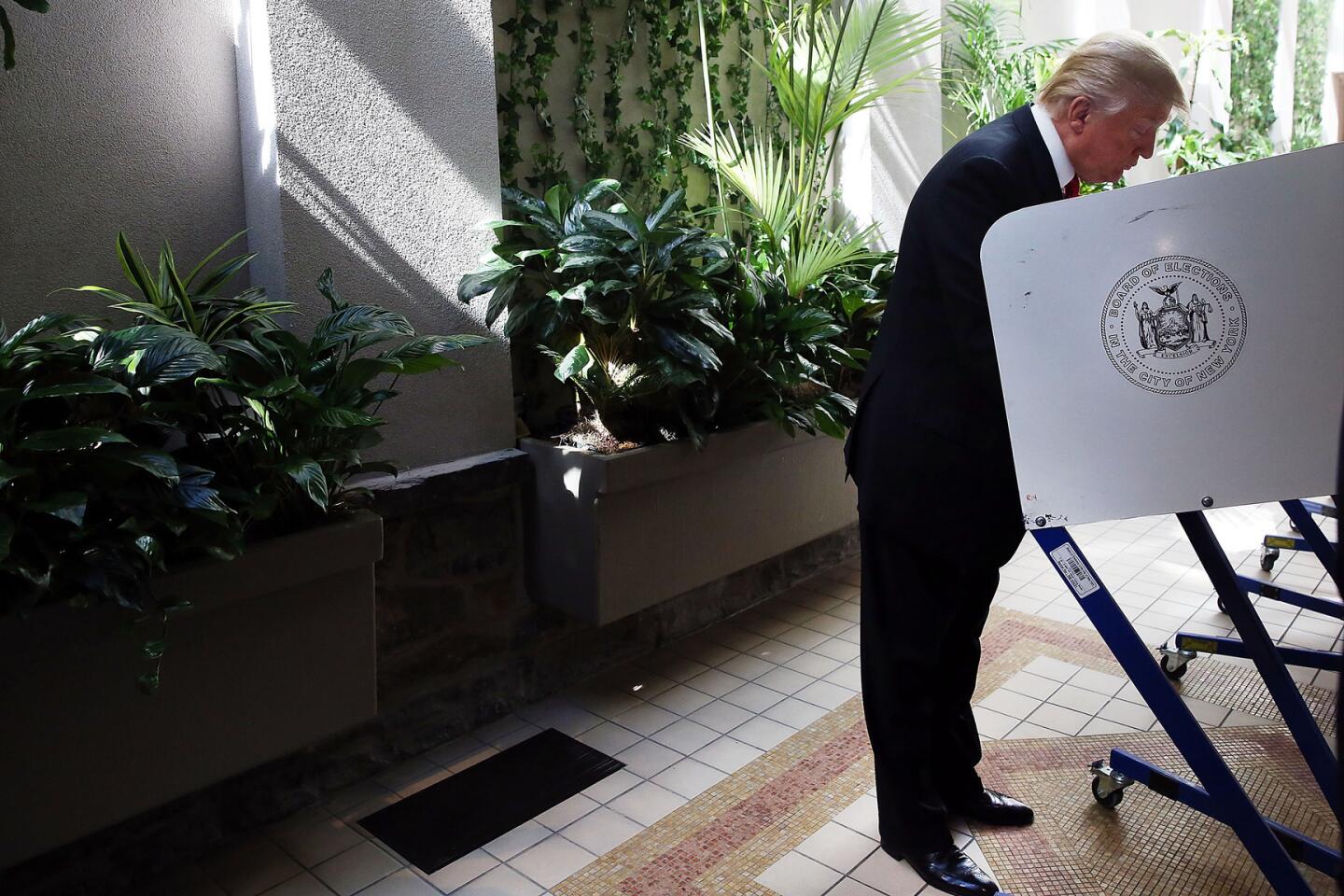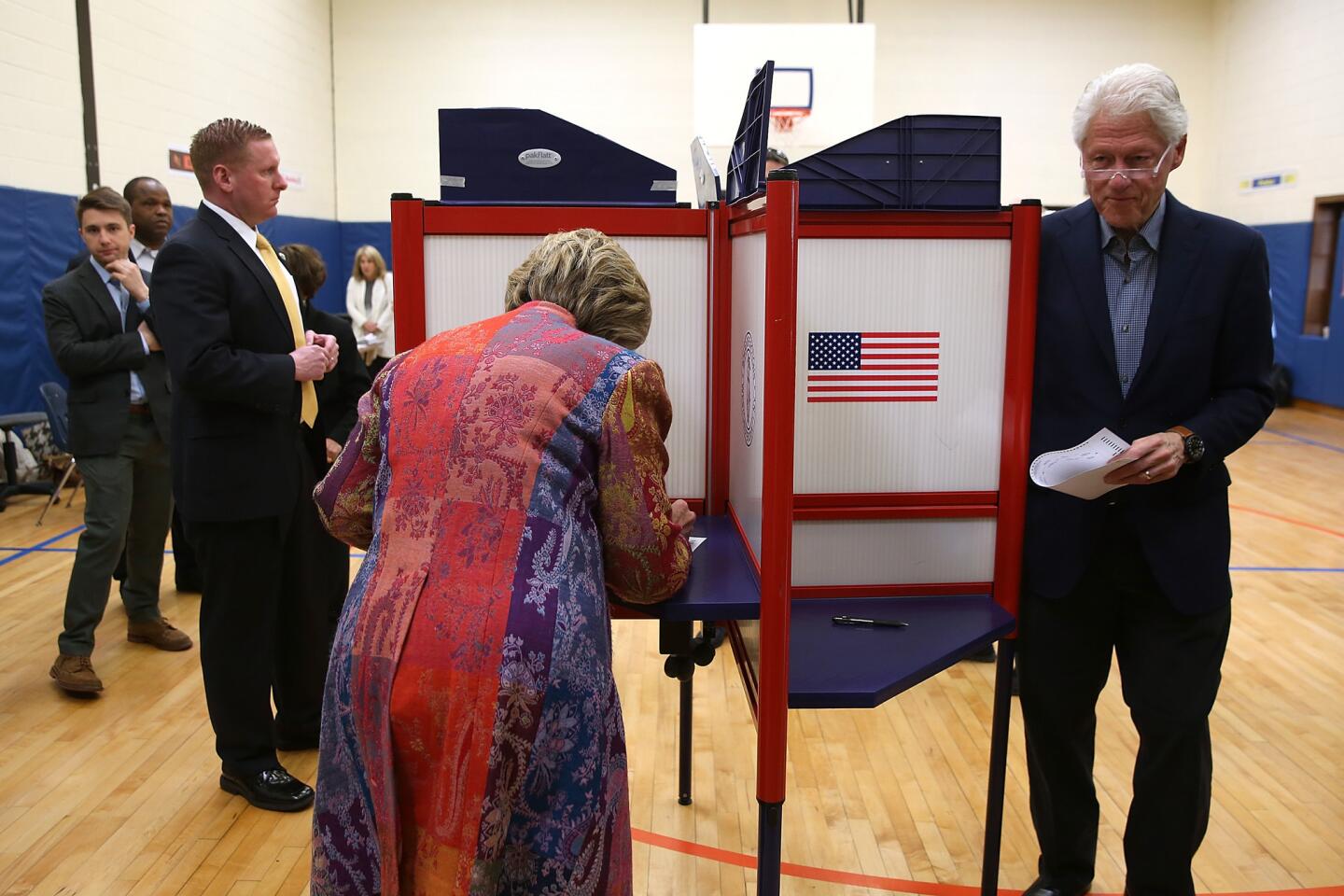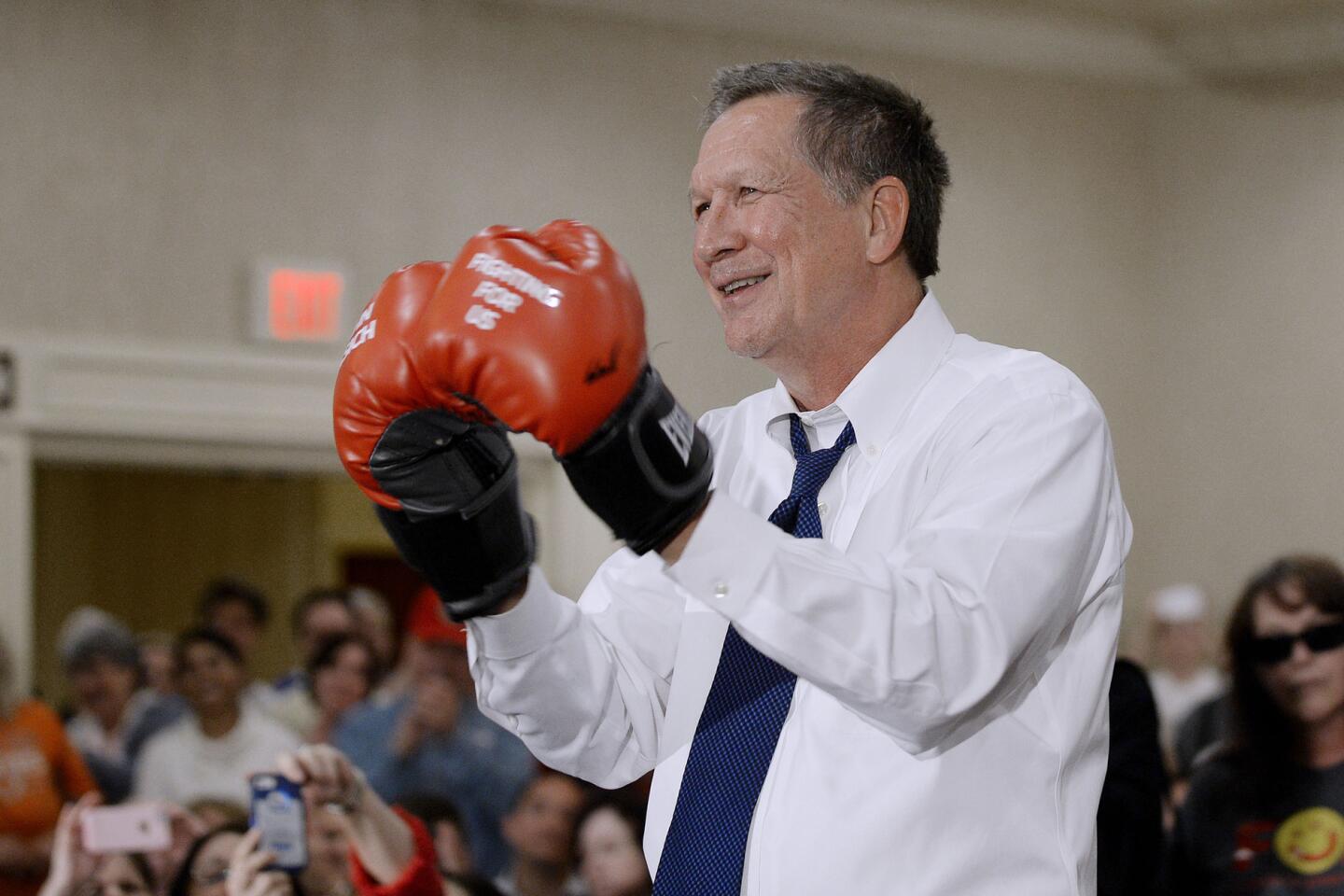Trump celebrates Republican primary victory in New York, still railing against system
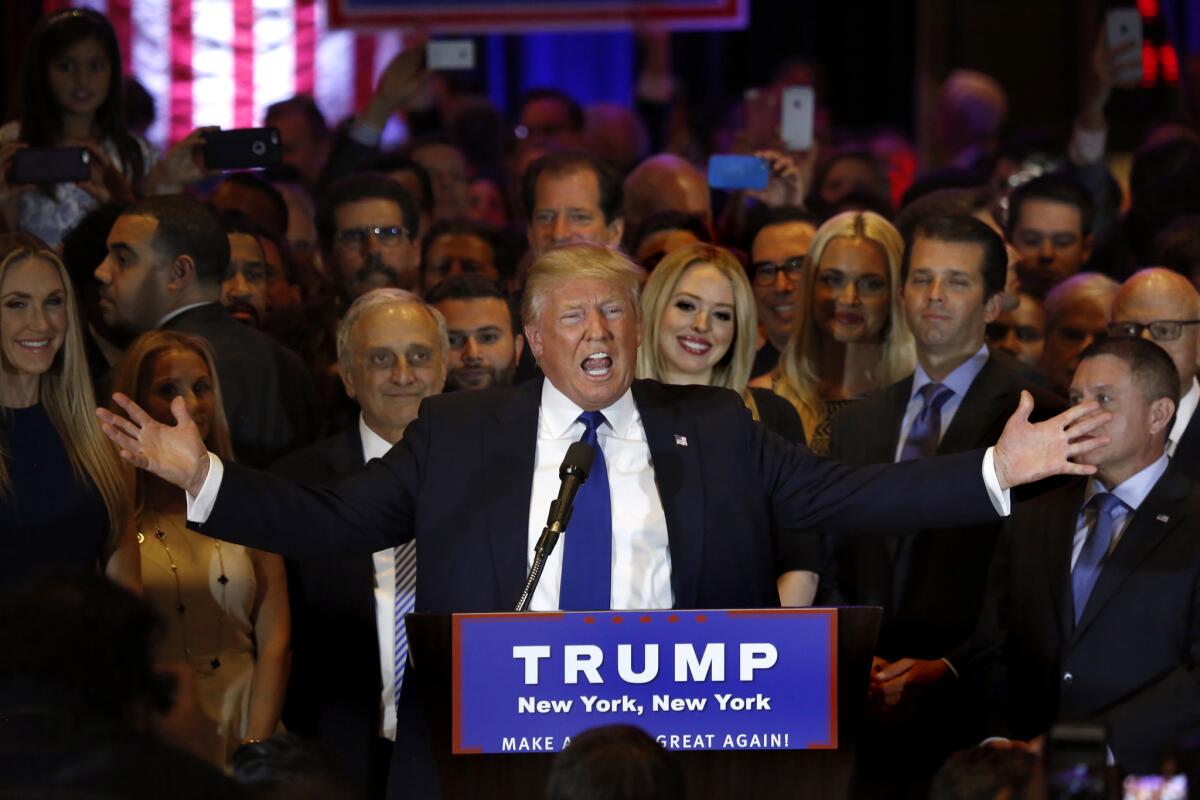
Republican presidential candidate Donald Trump celebrates in New York after his primary win.
- Share via
Reporting from New York — Donald Trump roared to a huge victory Tuesday in New York’s Republican primary, delivering a much-needed chance to reset his presidential campaign and retake the upper hand in the fight for the GOP nomination.
There had been little doubt Trump would carry his home state, where the real estate mogul is literally a household name: In giant letters and various forms, “Trump” adorns some of Manhattan’s most exclusive properties.
Live results from the New York primary
The outcome was clear the instant that polls closed, with the front-runner leaping to an enormous lead that never wavered. With nearly all of the votes counted, Trump had 60% support, followed by Ohio Gov. John Kasich with 25% and Texas Sen. Ted Cruz with 15.
The key question was the size of Trump’s victory and whether he would capture all of the delegates by winning 50% of the statewide vote and a majority in each of New York’s 27 congressional districts. It appeared he would claim at least the overwhelmingly majority of the state’s 95 delegates, with Kasich taking a handful.
The allocation was more than a matter of vanity or political perceptions. The GOP contest has become a hand-to-hand battle for delegates to the party’s July convention in Cleveland, where they alone will choose the nominee to carry the party standard into the fall campaign against Democrat Hillary Clinton or Bernie Sanders.
It takes a majority, 1,237 delegates, to be assured of the nomination before the GOP gathering, which appears to be Trump’s best hope as opponents work to stop him short and throw the convention open to one or another of his rivals.
Trump entered the day with 756 delegates, followed by Cruz with 559 and Kasich with 144. Trump’s substantial gain eases his quest for the nomination but still leaves the outcome far from certain.
“The path forward is a high wire,” said Bill Whalen, a research fellow at Stanford University’s Hoover Institution and speechwriter for former Republican Gov. Pete Wilson of California. “It is manageable, but there is no room for error on either side.”
Trump was blown out by Cruz in the last GOP contest, the April 5 primary in Wisconsin, and has been steadily losing ground to the senator’s better-organized campaign ever since, as Republicans seat their national delegates at state- and district-level conventions across the country.
Still, of the three candidates remaining, Trump is the only one with a realistic chance of winning the nomination on the first ballot in Cleveland.
In an effort to steady his campaign, Trump recently shook up its staff, bringing in some of the very Washington establishment figures he once criticized. Amid the upheaval, his campaign field director, a political neophyte, resigned as Trump sought to professionalize his delegate wrangling under Paul J. Manafort, a former lobbyist and longtime Beltway insider, who quickly moved to consolidate and extend his power.
In one sign of Manafort’s apparent influence, Trump has grown uncharacteristically restrained in his public comments, in a seeming effort to project a more presidential image. His victory speech Tuesday night was notably brief and absent the insults and braggadocio that characterized previous celebrations.
Nothing, however, could do more to quell growing doubts about Trump’s viability than seizing a big chunk of New York delegates, and his delight was evident as he walked through a crowd of supporters in the Trump Tower lobby with Frank Sinatra crooning, “New York, New York.”
“We’re really, really rocking,” Trump told backers in his Manhattan high-rise.
Trump minimized the recent upheaval in his campaign — “It’s actually a team of unity” — and renewed his criticism of the system that has allowed Cruz to gain convention delegates even in states he lost.
“The people aren’t going to stand for it,” said Trump, who has warned that riots could break out at the national convention if he is not victorious. “It’s a crooked system. It’s a system that’s rigged, and we’re going to go back to the old way. It’s called you vote and you win.”
New York was always going to be a difficult state for Cruz, whose religious conservatism was an ill fit for the state’s live-and-let-live ethos. He compounded his problems with an attack on Trump and his “New York values,” which may have resonated in Iowa and earlier contests but hit with a thud among voters here who took it as a personal slap.
By Monday, Cruz had abandoned New York and was campaigning in Maryland for that state’s primary next week.
On Tuesday night he was in Pennsylvania, which also votes next week, speaking to a small crowd gathered in the atrium of the National Constitution Center in downtown Philadelphia.
He dismissed Trump’s victory as “a politician winning his home state,” then went on to give an unusually soaring speech invoking the moon landing, the dawn of computers and other American achievements, while promising to make good on the best of President Obama’s rhetoric.
“Not ‘Yes we can,’ but now ‘Yes, we will,’” he said, invoking the signature theme of Obama’s 2008 campaign. “We will restore our spirit. We will free our minds and imagination. We will create a new and better world.”
Kasich was Trump’s main challenger in New York, though the governor conceded from the start that he would not carry the state.
Rather, his strategy was to pick off scattered delegates in a handful of friendlier congressional districts, including those on either side of Central Park, where the relatively few Republicans in Democratic New York City tend toward greater moderation than the typical GOP primary voter.
Kasich, while conservative, has been seen as more centrist than either Trump or Cruz, and more measured in his persona as well.
Dee Ann Boyd, 54, who lives in Midtown Manhattan and directs a nonprofit organization, voted for Kasich because she considers Trump “dangerous” and believes Cruz lacks the respect of his colleagues.
“I don’t think my vote is going to matter today,” said Boyd, noting that Kasich faced extremely long odds to win the nomination. “But I voted my conscience.”
Kasich held a town hall meeting Tuesday night in Annapolis, Md., concluding even before the New York polls had closed. He had no other election-night events.
From New York, the campaign heads to a batch of Eastern contests that includes Connecticut, Delaware and Rhode Island as well as Maryland and Pennsylvania. In all, 172 delegates will be chosen along a heavily urban corridor that seems to favor the citified Trump and his front-running campaign.
The political terrain is again less friendly to Cruz, and Kasich sees the contests as another chance to shoehorn himself into serious contention.
Follow @markzbarabak and @finneganLAT for national and California politics.
Times staff writer Chris Megerian in New York contributed to this report.
ALSO
Donald Trump is bad news for the GOP, but he’s great for Obama
Trump health plan would increase deficit and leave millions uninsured, report says
Strong Sanders and Trump runs reflect and inspire upheaval in Democratic and Republican parties
More to Read
Get the L.A. Times Politics newsletter
Deeply reported insights into legislation, politics and policy from Sacramento, Washington and beyond. In your inbox twice per week.
You may occasionally receive promotional content from the Los Angeles Times.
